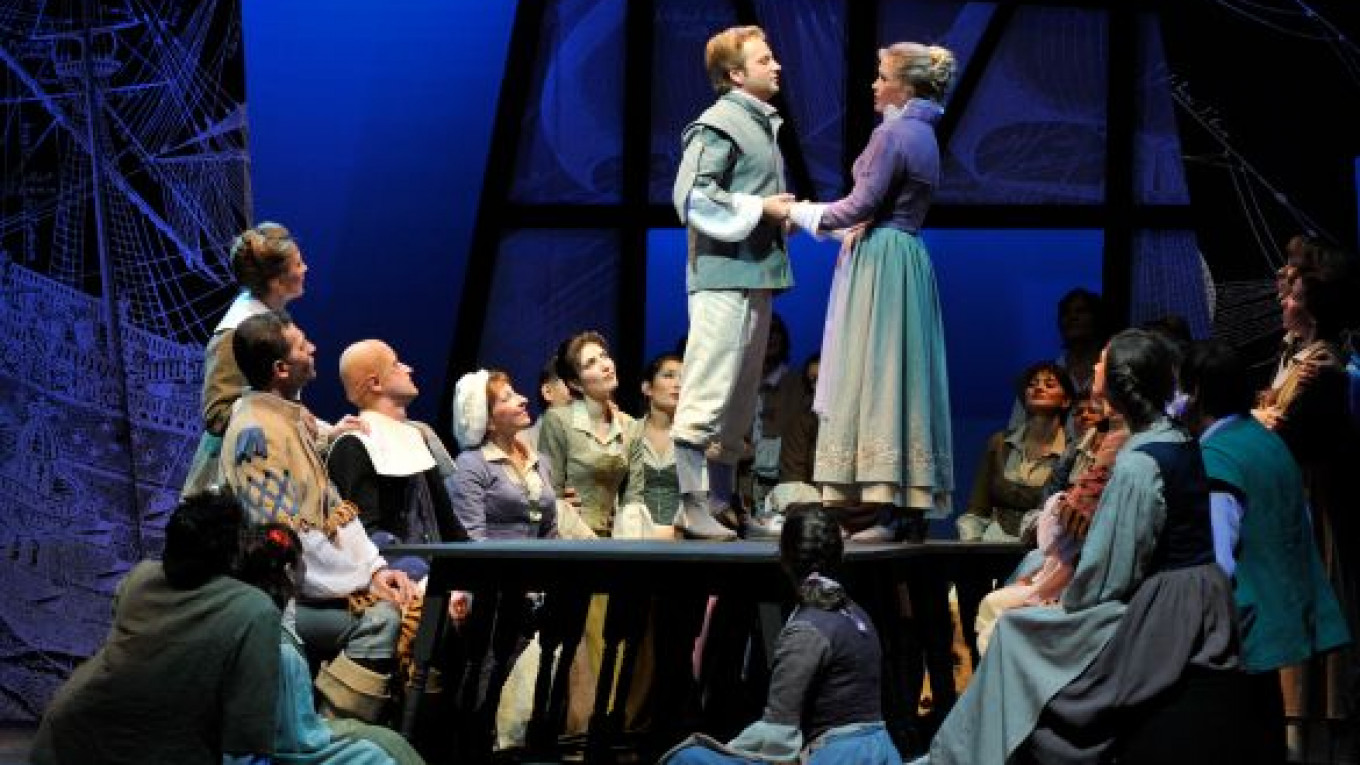Correction: The conductor was misidentified in an earlier version of this article. His name is Igor Gromov.
The Pokrovsky Chamber Musical Theater’s 40th season got off to lively and highly entertaining start last month when it added yet another out-of-way opera to its already adventurous repertoire.
The work in question was German composer Albert Lortzing’s “Zar und Zimmermann” (Tsar and Carpenter), dating from 1837, an opera quite popular in the 19th and early 20th centuries, but almost never to be seen and heard today except in German-speaking countries.
Concerning, as it does, the sojourn of Tsar Peter the Great in Holland during his so-called Great Embassy of 1697-98, “Zar und Zimmermann” seems a natural for the Russian stage. But it only found its way to Russia in 1907, following abolition of a ban on the theatrical depiction of members of the Romanov dynasty.
A year after its first Russian staging, which took place in St. Petersburg, the opera made its only previous Moscow appearance, in a production by the Zimin private opera company, and since then has been produced in Russia a mere three times, in 1917 and 1937 at what is currently St. Petersburg’s Mikhailovsky Theater and in 1940 at the Sverdlovsk (now Yekaterinburg) Theater of Opera and Ballet.
Peter the Great, using the name Peter Mikhailov, is known to have spent some eight days studying the art of shipbuilding in the Dutch town of Saardam. But apart from placing its action there, the story of “Zar und Zimmermann” seems entirely fictional, the invention of French and German playwrights on whose works Lortzing based his libretto.
Rumors of Tsar Peter’s presence have spread through Saardam, but opinion differs as to whether the tsar is Peter Mikhailov or another Russian working at the shipyard, one Peter Ivanov, who is, in fact, a deserter from the Russian army. The town’s buffoonish mayor, Van Bett, and his niece, Marie, both think Ivanov must be the tsar, the latter falling in love with him, but depressed because she believes she could never become his bride.
The tsar is abruptly summoned to Moscow to quell an uprising. He cannot leave, however, as Saardam has been rather mysteriously blockaded. Believing Ivanov to be the tsar, the English ambassador gives him a safe-conduct pass. Ivanov hands the pass on to the real tsar, who, before making his escape, gives Ivanov a letter in which he consents to the marriage of Ivanov and Marie and rewards the young man with appointment as head of the imperial inspectorate.
The Pokrovsky’s staging of “Zar und Zimmermann” was entrusted to the experienced German director Hans-Joachim Frey, who was also in Moscow to preside over the final rounds of last month’s vocal competition “Competitizione dell’Opera” at the Bolshoi Theater. Frey has given the opera a mostly straightforward staging, in period costume and against a background of period ship-construction drawings, highlighted by moments of very effective and un-self-conscious stylization. Among Frey’s many fine touches are the myriad of various sized wooden shoes that the chorus taps out and eventually cavorts about in to the catchy music of the clog dance near the end of the opera’s final act.
Lortzing may not have numbered among the great composers of his day, but he was certainly a superb tunesmith. And at the Pokrovsky his delicious tunes are sung in quite acceptable-sounding German. The opera’s considerable dialogue, however, is rendered in Russian translation — a wise decision on the theater’s part, benefiting not only the audience, but also the singers, who would no doubt have been hard put to speak the words in a reasonably idiomatic way.
The cast members seen at a preview performance all fit their parts well, dealt smartly with Frey’s staging and generally sang with distinction. Of particular note were the sturdy-voiced Tsar Peter of baritone Roman Bobrov, the convincingly youthful and clearly sung Ivanov of tenor Vitaly Rodin and the splendidly befuddled Van Bett of bass Anatoly Zakharov. Conductor Igor Gromov led a lively accompaniment and managed to create the illusion of full-scale orchestral sound from the very limited number of players, especially strings, able to squeeze into the Pokrovsky’s tiny orchestra pit.
Besides “Zar und Zimmermann,” the Pokrovsky has in its repertoire yet another fine production of a German comic opera written just a decade later, Otto Nikolai’s “Die lustigen Weiber von Windsor” (The Merry Wives of Windsor), while at the end of October, Helikon Opera plans to stage Richard Wagner’s seldom-heard early opera “Das Liebesverbot” (The Ban of Love), based on William Shakespeare’s “Measure for Measure,” which originally premiered just a year before “Zar und Zimmermann.” With that, Moscow may well become the only city in the world to have on its stages three such German rarities of practically the same vintage.
“Zar und Zimmermann” (Tsar i plotnik) next plays Dec. 9 at 7 p.m. and Dec. 10 at 6 p.m. at the Pokrovsky Chamber Musical Theater, located at 17 Nikolskaya Ulitsa. Metro Teatralnaya, Ploshchad Revolyutsii. Tel. (495) 606-7008.
A Message from The Moscow Times:
Dear readers,
We are facing unprecedented challenges. Russia's Prosecutor General's Office has designated The Moscow Times as an "undesirable" organization, criminalizing our work and putting our staff at risk of prosecution. This follows our earlier unjust labeling as a "foreign agent."
These actions are direct attempts to silence independent journalism in Russia. The authorities claim our work "discredits the decisions of the Russian leadership." We see things differently: we strive to provide accurate, unbiased reporting on Russia.
We, the journalists of The Moscow Times, refuse to be silenced. But to continue our work, we need your help.
Your support, no matter how small, makes a world of difference. If you can, please support us monthly starting from just $2. It's quick to set up, and every contribution makes a significant impact.
By supporting The Moscow Times, you're defending open, independent journalism in the face of repression. Thank you for standing with us.
Remind me later.






